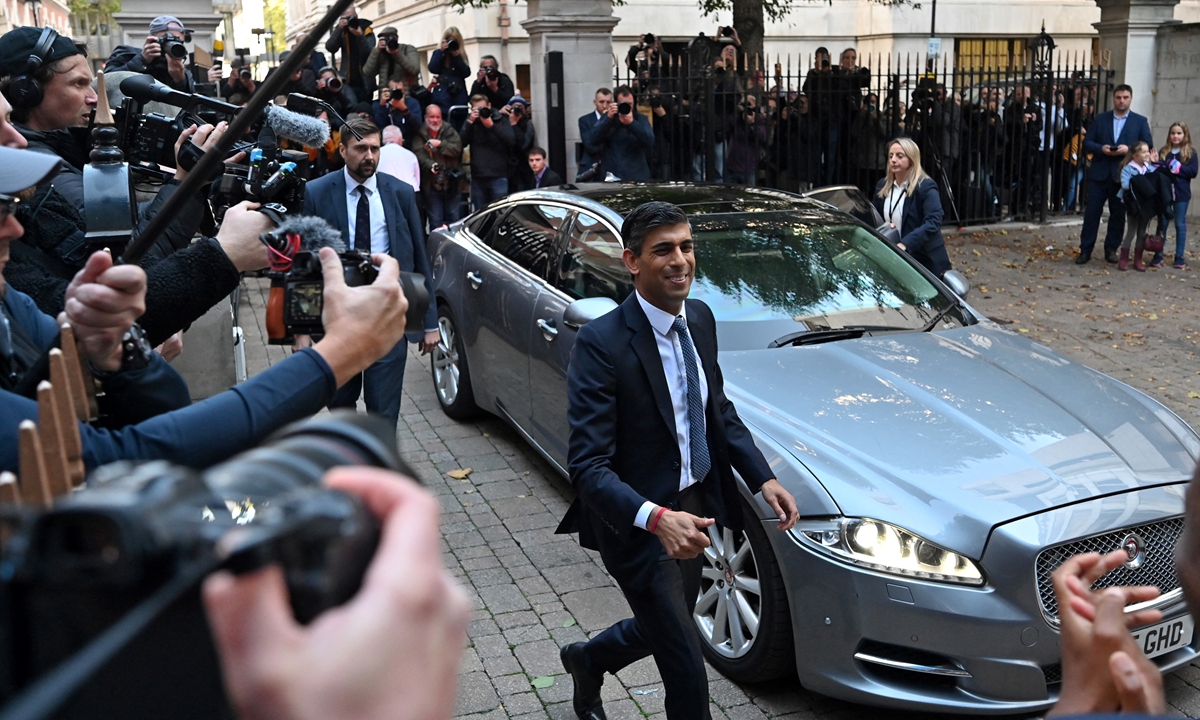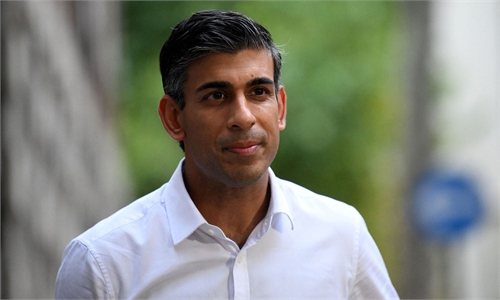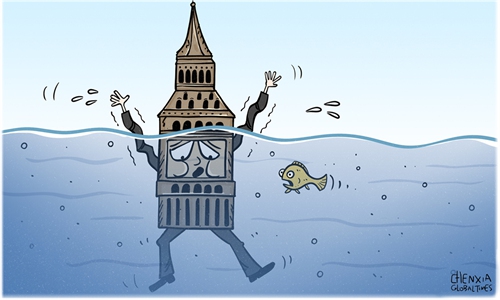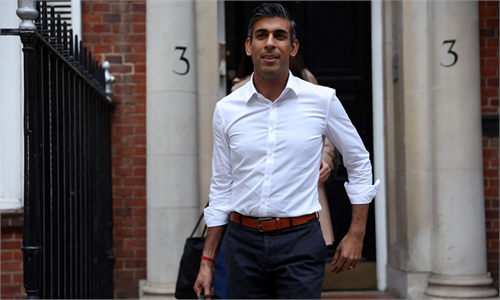
Rishi Sunak arrives at Conservative Party Headquarters in central London, Britain on October 24, 2022. He will be UK's next prime minister replacing Liz Truss, who resigned after just 45 days in office. Photo: AFP
Right after he took office, Britain's new Prime Minister Rishi Sunak and the US President Joe Biden talked on the phone on Tuesday. Both sides agreed to work together to support Ukraine; and Sunak emphasized on US-UK cooperation in the Indo-Pacific region to counter "China's malign influence."
However, Chinese observers said as both two leaders are crippled by deep-rooted domestic woes and have little political capital to solve them, it is questionable how much weight the special relationship carries now.
Yet experts also said that Biden, who faces dark outlook of the looming midterm election, surging inflation and other domestic issues, may not be happy to see a fragile ally, thus how rock solid their relationship is also depend on Sunak's capacity of addressing the UK's problems.
Chinese experts predict that as Sunak is embattled with economic gloom at home, it is impossible for him to present a complete China policy in at least half a year, nor will he continue his predecessor Liz Truss' hard line approach, such as the attempt to label China as a "threat," since further frayed Beijing-London tie will only add fuel to the fire to current plight the UK is facing. They urged Sunak, who has technocratic style of governing, to continue pragmatism when he reviews relations with China and regard Beijing as cooperation partner, rather than views China as an enemy just to please the US.
Chinese Premier Li Keqiang on Wednesday sent a congratulatory message to UK's new prime minister Rishi Sunak for taking office. Li said China is willing to push forward bilateral ties for a healthy and stable development.
Sunak talked to Biden earlier. According to a read-out of the call released by Downing Street, the two discussed about the extent of UK-US cooperation, "in regions such as the Indo-Pacific where the AUKUS pact forms part of our efforts to enhance stability and counter China's malign influence."
In response, Wang Wenbin, spokesperson of China's Ministry of Foreign Affairs, said at Wednesday's briefing that China is a partner of every country's development, not challenge and threat. He also urged the US to discard zero sum mentality, instead of spreading cliché "China threat" theory, it should contribute more to world development and peace.
This is the first time Sunak publicly revealed his stance on China since taking office. Although when challenging his predecessor Liz Truss, who survived in the office for merely 45 days, Sunak promised to ban China's Confucius Institutes in the UK and label the country the "biggest long-term threat to Britain." During campaign, Truss also intended to redesignate China as a "threat."
Election campaign language should not be trusted as candidates would be competing who speaks louder and harsher to please the audiences, Cui Hongjian, director of the Department of European Studies at the China Institute of International Studies, told the Global Times.
Experts said that as long as London is determined to serve as a vassal of Washington on curtailing China's development, the UK is likely to continue a tough policy on China no matter who occupies 10 Downing Street.
It is impossible for Sunak to hand out a comprehensive China-policy in the short term, said Cui, explaining that it's because the new UK prime minister, who inherited massive problems, including an economy mired in crisis, will have his hands tied to solve domestic problems during the first months of his reign.
Sunak had used his first speech as prime minister on Tuesday to warn that the UK is in the grip of an economic crisis as he vowed to fix "mistakes" made by Truss and win back voters' trust.
He warned there would be "difficult decisions to come" in an attempt to regain economic stability and avoid borrowing mounting up.
Before Truss stepped down, the Guardian reported that she was mulling to formally designate China as a "threat" to the UK, as a rewrite of former prime minister Boris Johnson's defense and foreign policy.
The new prime minister is likely to walk back some hard line rhetoric of Truss not only because he needs to be fully devoted in clearing the domestic mess, "if Sunak proves to be a rational politician, he will not risk fraying the already strained China-UK ties, when the UK economy is in deep trouble now," said Li Guanjie, a research fellow from the Shanghai Academy of Global Governance and Area Studies, under the Shanghai International Studies University, noting a tougher stance on China will risk upending economic and trade cooperation between Beijing and London.
He also noted that the read-out published by both the White House and Downing Street did not refer to China as a "threat" which means Sunak is not likely to repeat Truss's tough stance, at least not for now.
China is now the largest source of imports for the UK worth 63.6 billion pounds ($611 billion) or 13.3 percent of all goods imports, according to statistics from the UK Office for National Statistics. There are about 144,000 Chinese students studying in Britain according to 2022 statistics from the Higher Education Statistics Authority, a number that is up 50 percent in just five years, BBC reported in March.
When serving as Chancellor of the Exchequer, Sunak continued to advocate for a "mature and balanced" relationship with China and sought to improve trade links with the country, by resurrecting the China-UK Economic and Financial Dialogue, the Financial Times reported.
After taking office, Sunak will review relationship with China from an all-round perspective, from diplomacy, military to security, not solely from the standpoint of economic cooperation, said Cui, urging Sunak, who possesses technocratic style of government, to inherit the pragmatism of financial minister, and regard China as a partner in cooperation, rather than a threat.
Pragmatism needed
Chinese observers said that Sunak is likely to continue the overall diplomatic policies made by Boris Johnson, pragmatic on trade ties with China while tough on political issues, as Sunak's only seven-year career in national politics, and the swift, truncated nature of his election has not fully prepared him.
One of the characteristics of the Johnson policy is aligning close with Washington on ideology and security, and such close ties will be maintained by Sunak, said experts.
When Sunak prevailed in the race for Conservative leader, US President Joe Biden, reacted to the UK's first Indian-origin prime minister, said it was "pretty astounding" and a "ground-breaking milestone."
In their call on Tuesday, Biden also said that "the UK remains America's closest ally, and the prime minister agreed on the huge strength of the relationship," according to the read out released by Downing Street.
Yet experts also said that Biden, who faces dark outlook of the looming midterm election, surging inflation and other domestic issues, may not be happy to see a fragile ally, thus how rock solid their relationship is also depend on Sunak's capacity of addressing the UK's problems.
When Truss was in office, Biden's economic team had also clashed with her team privately over its proposal to cut taxes for high earners. Treasury Secretary Janet L. Yellen joined several other finance ministers from the Group of 7 nations this month in criticizing their British counterpart over the plans, The New York Times reported last week.
In fact, the UK is still marred in post-Brexit chaos rippled with political turmoil, yet the country is needed in discussion of a slew of international issues such as G20 and climate change. If the new prime minister falls short of solving domestic problems, how could he lead the nation to better engage in international cooperation, said Wang Yiwei, director of the Institute of International Affairs at the Renmin University of China.




